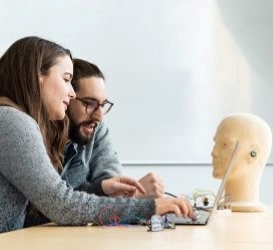
Submitted by Rachel Gardner on Mon, 27/09/2021 - 16:44
A prototype personal navigation device we could wear in our ears, created by two students here, has just won an award at an international conference.
The 'PilotEar' prototype was created by Master's student Ashwin Ahuja and PhD student Andrea Ferlini, working with their supervisor Professor Cecilia Mascolo. Their report into its development and testing - PilotEar: Enabling In-ear Inertial Navigation - has just collected the Best Paper Award at EarComp 2021, an international workshop on earable computing run alongside UbiComp 2021.
Among researchers into wearable technologies, there has been a recent explosion of interest in earables - or ear-worn wearables, like the earbuds we wear with our mobile phones. In this paper, for the first time, the students explored whether they could be used to create an inertial navigation system (INS), a navigational system capable of calculating position, either relative to some reference system/point or to absolute coordinates.
Ashwin and Andrea realised that earables could be used to track head movements which, in turn, could act as a proxy for visual attention. As a result, they thought, earables could be used as a personal wearable navigation system, with the user being offered navigation guidance via audio feedback. Unlike other wearables, they point out in their paper, earables present the unique opportunity of two distinct vantage points (one from each ear), which could be leveraged to increase the overall performance of the navigation system.
To test out this idea, the students prototyped an earable platform - PilotEar - for collecting and transmitting accelerometer, gyroscope, and magnetometer data over Bluetooth Low Energy (BLE) and audio feedback.
They then ran experiments in which six walkers trialled their prototype system, both indoors and outdoors. The students also created an iPhone application to help guide the walkers to a target heading. By turning their heads, the user could audibly gain an understanding of the correct direction: they would hear a tone that rose higher in pitch as they faced the correct direction.
Afterwards, the students compared the target heading with the ground truth reference heading to see how closely the walkers had followed the guide path, or how far they had drifted from it. They were very pleased to find that there was minimal drift from the path even when the walker was wearing just one earable, rather than two.
"Our work defines an effective calibration scheme," they conclude, "as well as precise heading and displacement estimation methods. Ultimately, we believe that PilotEar, providing acoustic feedback, could offer significant benefits for navigation, particularly for visually impaired people."
Congratulations to both Ashwin and Andrea.

